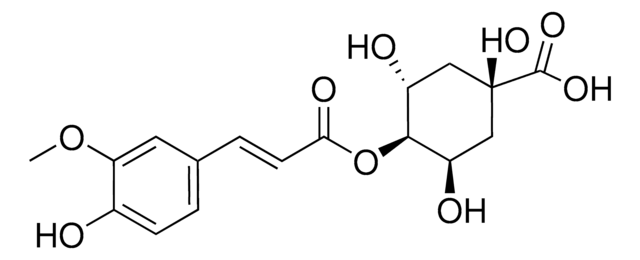Fontos dokumentumok
PHL80425
3,4-Dicaffeoylquinic acid
phyproof® Reference Substance
Szinonimák:
4,5-Di-O-caffeoylquinic acid, 4,5-Dicaffeoylquinic acid (CAS), Isochlorogenic acid C
About This Item
Javasolt termékek
grade
primary reference standard
termékcsalád
phyproof® Reference Substance
Teszt
≥95.0% (HPLC)
form
solid
gyártó/kereskedő neve
PhytoLab
tárolási hőmérséklet
2-8°C
SMILES string
O[C@@H]1C[C@@](O)(C[C@@H](OC(=O)\C=C\c2ccc(O)c(O)c2)[C@H]1OC(=O)\C=C\c3ccc(O)c(O)c3)C(O)=O
InChI
1S/C25H24O12/c26-15-5-1-13(9-17(15)28)3-7-21(31)36-20-12-25(35,24(33)34)11-19(30)23(20)37-22(32)8-4-14-2-6-16(27)18(29)10-14/h1-10,19-20,23,26-30,35H,11-12H2,(H,33,34)/b7-3+,8-4+/t19-,20-,23+,25-/m1/s1
Nemzetközi kémiai azonosító kulcs
UFCLZKMFXSILNL-RVXRWRFUSA-N
Looking for similar products? Látogasson el ide Útmutató a termékösszehasonlításhoz
Related Categories
Általános leírás
Alkalmazás
- Neuroprotection in Parkinson′s Disease: Research on 3,4-Dicaffeoylquinic acid from Calendula officinalis highlights its potential neuroprotective effects through modulation of the PI3K and ERK signaling pathways, suggesting its application in Parkinson′s disease management (Zhang et al., 2024).
- Antioxidant and Anti-inflammatory Activities: Studies on the antioxidant and anti-inflammatory properties of 3,4-Dicaffeoylquinic acid in Merremia umbellata extract suggest its therapeutic potential in treating inflammatory conditions, making it a valuable component in natural phenolic compound research (Lee et al., 2023).
- Hypoglycemic Effects on Type 2 Diabetes: 3,4-Dicaffeoylquinic acid has been studied for its hypoglycemic effects via network pharmacology and transcriptomics, showing promise in type 2 diabetes treatment. This research underscores its importance in biochemistry and pharmacological innovations (He et al., 2024).
- Screening Natural Antioxidants: The compound′s effectiveness in screening and evaluating natural antioxidants demonstrates its utility in developing analytical standards for identifying potent bioactive compounds in various botanical parts (Yang et al., 2024).
- Molecular Docking for Drug Development: 3,4-Dicaffeoylquinic acid is used in molecular docking studies to identify interactions with PPARγ, aiding in the discovery of potential drug candidates from natural sources. This application is crucial for advancing drug discovery in biochemistry and pharmaceutical sectors (Elkhattabi et al., 2023).
Egyéb megjegyzések
Jogi információk
Tárolási osztály kódja
11 - Combustible Solids
WGK
WGK 3
Lobbanási pont (F)
Not applicable
Lobbanási pont (C)
Not applicable
Válasszon a legfrissebb verziók közül:
Analitikai tanúsítványok (COA)
Nem találja a megfelelő verziót?
Ha egy adott verzióra van szüksége, a tétel- vagy cikkszám alapján rákereshet egy adott tanúsítványra.
Már rendelkezik ezzel a termékkel?
Az Ön által nemrégiben megvásárolt termékekre vonatkozó dokumentumokat a Dokumentumtárban találja.
Tudóscsoportunk valamennyi kutatási területen rendelkezik tapasztalattal, beleértve az élettudományt, az anyagtudományt, a kémiai szintézist, a kromatográfiát, az analitikát és még sok más területet.
Lépjen kapcsolatba a szaktanácsadással






